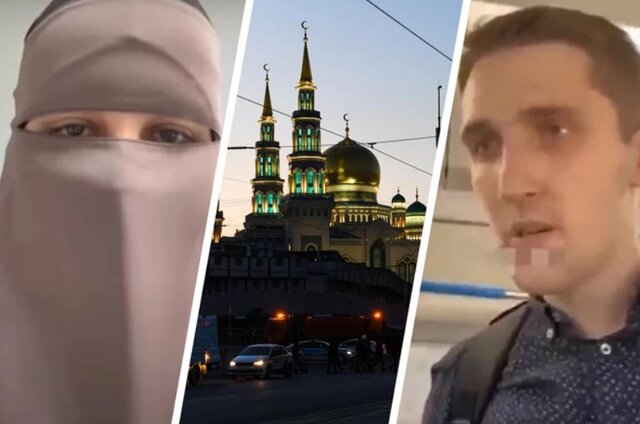The scandal over an Islamophobe on Moscow’s public transport demanding that a Muslim woman (who turned out to be Russian) remove her niqab, not once but again, has become instructive in many ways. No, not because the story itself is extraordinary. Such things happen all the time in many places, and often worse, because in this case there was no violence or explicit insults (though there was certainly a threat to the sister and the situation was stressful for her, may Allah reward her for it). Moreover, it is important to note the reaction of many Muscovites, both those who were present during the incident and those who discussed it on various platforms. Ordinary people, non-Muslims, came to the sister’s defense, and there were many who condemned the Islamophobe who harassed her, although Islamophobic comments clearly dominated many platforms.
But that’s where the most instructive part begins. Because on the one hand we see that there is a tolerant and progressive part of Russian society. And on the other hand, we can clearly see that this part does not set the weather in Russia, does not rule Russia, and does not convey the attitudes of the ruling circles. This was demonstrated in subsequent reports on Kremlin-controlled TV channels such as NTV, as well as in publications in pro-government media.
For example, here is an article with a very clear and unambiguous title «Wearing niqab should be banned by law» on a Telegram channel with 2.3 million subscribers, which is part of the so-called Kremlin pool and funded by the presidential administration (https://t.me/readovkanews/65599). Let’s quote some significant excerpts from this text, which represents the worldview not only of its authors, but also of the entire Russian ruling class and its support among the Russian population:
«(Wearing the niqab)… creates divisions in society and even causes antipathy toward ordinary believers who are averse to radicalism… The question is not why a random metro passenger asked a face-covering person to conform to generally accepted social norms, but why the police did not do so… The niqab… has nothing to do with traditional Islam… it is forbidden to wear in public places and on the street. The same rules apply in many European countries… Russia, where Orthodoxy is the main religion, respects the rights of other religions and the traditions of all its peoples, but wearing the niqab or burqa does not fall into either category.»
What is important for us to understand here? Among Islamic theologians, there are indeed different attitudes towards the niqab, ranging from its obligatory nature, especially in certain situations, to recognizing the right of Muslim women to wear it or not. Today, there are scholars who consider it undesirable to wear the niqab where it is not accepted, especially by non-Muslims, not because the niqab itself is considered objectionable, but rather because of weighing its benefits and harms, taking into account local customs, and so on.
All of these opinions and debates are well known to those who have studied the issue, and we do not intend to enter into those discussions in this case. The question is different… Leaving aside the irrelevant arguments, the main arguments put forward by Russian propagandists in favor of banning the niqab in Russia are, on the one hand, that it is banned in some European Christian countries, and that Russia’s culture is defined by them as Christian, and, on the other hand, that the niqab is supposedly foreign to «traditional Russian Islam».
This raises a question for Muslims who are «for Russia,» especially those who live in its Muslim regions. If the ruling circles in relation to Muslims refer to the experience of European Christian countries and consider Russia to be the same as these countries, why should there be Chechnya, Ingushetia, Dagestan, Karachay, Circassia, Nogai, Tatarstan, Bashkortostan in such a country? And furthermore, why should they not only be themselves in this country, but also fight to squeeze more territories into it, with an additional number of ethnic Christians?
One can argue about whether Muslim women should wear the niqab in Paris or Warsaw, and opinions can really vary in this regard. But why should Muslims living in Grozny or Makhachkala on their own land put themselves in the position of those Muslims who voluntarily came to foreign, non-Muslim countries and are forced to adapt to their rules of the game?
And the last question, concerning the traditions or non-traditions of Muslim peoples who found themselves in Russia — why should this be decided not by them, but by Russian Islamophobes? Not even ordinary Russians, among whom, it seems, there are many who do not object to the wearing of the niqab, let alone Russian Muslims themselves, who have been turned into pariahs in this country for decades, but specifically by Islamophobes who define the moral and political climate in Russia?
But to be honest, all these questions are rhetorical. Because it has long been clear that Russia is ruled by rabid chauvinists who clumsily hide behind rhetoric about tolerance of religions and the rights of other peoples (and all non-Russians are «other peoples» to them, despite the fact that many of these peoples are indigenous to this country). It is also clear that this chauvinism is not directed against just one thing, implying tolerance for something else, but is hostile to everything that does not fit its bearers’ ideas about the «Russian world,» whether it is Muslims, Ukrainians, the West, or even Russians themselves with different world views.
The biggest mystery, however, is that many who consider themselves Muslims, including those who are observant, support these chauvinists who then tell them what is part of their traditions and what is not, and how their wives should dress in their «Orthodox country». And it is indeed difficult to find an answer as to why this is the case…

